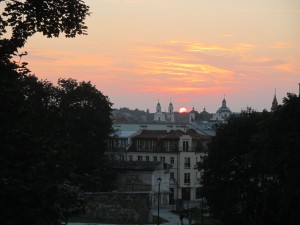I was sitting in Cathedral Square when the drum circle arrived. Or what looked like a drum circle. If drum circles also had clocks, like the kind of clock you would hang in your kitchen. Large roman numerals, round. Gold frames. They were walking straight toward me, carrying white blocks the size of trumpet cases, maybe forty of them, college students or slightly older, speaking English, heavily accented English, accents that didn’t match. I froze. The hard cement flowerbed behind me dug into my lower back. Cigarette smoke drifted in from multiple angles. My laptop teetered on my knees.
A goateed man in flannel and leather sidled up next to me. He looked down the length of his nose at my belongings scattered across the bench.
“Ah, you want to stay where you’re at, no?”
Did that mean stay or go? Sunshine broke through the clouds as if attempting to guide my decision. Two weeks in Vilnius had taught me to accept off-the-wall situations as an inevitable part of daily life. On any given day, I could wind up having lunch with strangers, staying out until three a.m. at any number of the lively bars or clubs, or joining a drum circle.
“You are from Lithuania, no?” Lithuania came out in two syllables.
“Yes. Wait, no. I have been here two weeks, so maybe it feels that way.” I laughed, a self-deprecating little laugh that masked the sense of disorientation I had felt since I had flown the four thousand miles to get there. Everything about July in Old Town Vilnius was beautiful – the architecture, the restaurants lining every street, the art, the people. But the white nights, the ubiquitous twilight, cast a sense of displacement I couldn’t quite navigate.
Maybe that was the point.
“I am from the U.S. I live in Nagoya, Japan. What is this here today?”
“We are the European Union Project for Youth Connection,” the goateed man said, flicking cigarette ash on the toe of my shoe. “You know LGBT? We are here to speak out against homophobia. Our theme is Different People Same Love. We perform in museum, and then we play in street here. Music. You know.”
“You are all from Vilnius, no?” I said. I moved my bag for him to sit down.
“Ah, we are from Greece, Italy, Poland, Spain, Turkey. Only some, Lithuania.”
A fair-skinned twenty-something woman in a cloth cape barked orders to the group from atop one of the blocks I now realized were seats.
“Get in your language groups!”
A flurry of stool scraping and sneaker shuffling ensued as the group dispersed into six groups. Each group spoke a different native language. After seven months living in Nagoya, where next to no one spoke English, I felt right at home.
* * *
The next day, I participated in the Baltic Gay Pride Parade. I had kicked off the weekend at Soho Club, Vilnius’ only gay bar, the night prior, dancing the night away to a vibe of thumping techno music. The club had been packed with homosexuals and heterosexuals alike, many wearing pins or carrying tiny flags in support of the weekend’s march.
The parade was historic. The parade marched down Gediminas Avenue, the central street of the main city within a historically homophobic country. Hundreds of police officers lined the streets. Men in full bomb squad fatigues and masks patrolled the edges of the event, primed for action should protestors grow hostile. There had been rumors of organized retaliation, of protestors charging the commons where the parade was to commence. Earlier in the day, I had dragged my suitcase over the cobblestone sidewalks along Gediminas Avenue. Every one of the dozens of cops I passed eyed me suspiciously, their heads following me as I walked by. I was searched multiple times. I am unarmed! I wanted to shout. I am here to support the parade!
The event was not without its challenges. Small groups of protestors waited in the wings, holding anti-gay signs, protesting through megaphones and throwing eggs. Some protestors were escorted off the premises.
But that the parade was happening gave people hope. That the parade was happening signified change.
“First they ignore you, then they ridicule you. Then they fight you, and then you win.”
The speeches on the main stage opened with this quote by Mahatma Gandhi. As I looked around at the thousands of brightly colored flags, the people from across the EU, the globe, marching for equal rights, the organization of which, overall, turned out to be a relatively peaceful demonstration, one word floated through my head. Progress.





